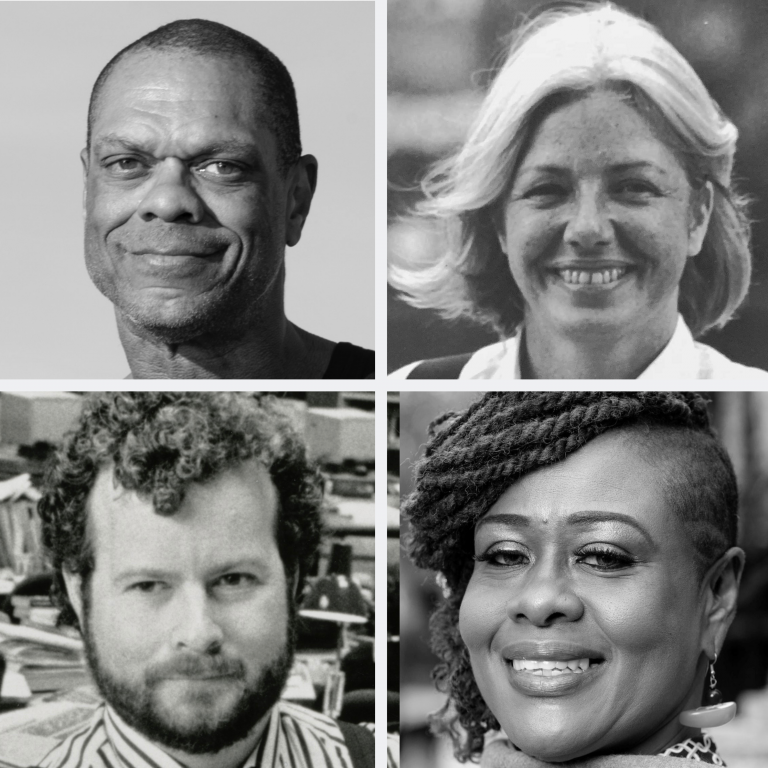Season 10 — Preview
 Clockwise from top left: Randy Boyd, 2018, credit: Sean Black; Ann Northrop, ca. 1988, credit: Milagros Melendez (seen in "The Gay Metropolis: The Landmark History of Gay Life in America"); Michelle Lopez, 2020, credit: GMHC; Randy Shilts, 1987, credit: Scott Sommerdorf / San Francisco Chronicle / Polaris / Randy Shilts Papers, Hormel LGBTQIA Center, San Francisco Public Library.
Clockwise from top left: Randy Boyd, 2018, credit: Sean Black; Ann Northrop, ca. 1988, credit: Milagros Melendez (seen in "The Gay Metropolis: The Landmark History of Gay Life in America"); Michelle Lopez, 2020, credit: GMHC; Randy Shilts, 1987, credit: Scott Sommerdorf / San Francisco Chronicle / Polaris / Randy Shilts Papers, Hormel LGBTQIA Center, San Francisco Public Library.Preview Notes
We’re back with more stories from the AIDS crisis. Hear Eric Marcus in conversation with six people whose lives and activism were transformed by the AIDS epidemic in the 1980s and beyond.
———
Preview Transcript
Eric Marcus Narration: I’m Eric Marcus and we’re back for season 10 of Making Gay History.
This time I’d like to introduce you to six people whose lives were forever changed by the AIDS epidemic. Their stories will expand on what you heard last season, when I shared some of my own experience from the first dozen years of the AIDS crisis. And I hope they’ll give you a deeper understanding of what people lived through—in the 1980s and beyond.
Among those you’ll hear from is novelist Randy Boyd. As a closeted Black kid from Indiana, Randy quickly realized that he wouldn’t fit in at the University of Southern California. Instead, he found community in L.A.’s gay bathhouses.
———
Randy Boyd: I mean, how could I not have been HIV positive? I turned 18 in 1980. A month after my 18th birthday, in February of 1980, I go to my first bathhouse. And I start going to these sexual venues as my only real way of defining myself as a gay man. So I went for social and sexual reasons. And, by god, let’s face it, we all need sex. And when you’re young, you really need it bad. There’s no way in the world I couldn’t be HIV positive.
———
EM Narration: Pioneering gay journalist Randy Shilts wrote And The Band Played On, the 1987 bestseller about the history of the AIDS crisis. His early reporting on San Francisco’s exploding epidemic made him a pariah in that city’s tight-knit gay community.
———
Randy Shilts: And I mean, I got, did nothing but answer phone calls all day from people, gay political leaders, trying to get me not to do that story.
Eric Marcus: What did you tell them?
RS: I just told them I don’t get paid to not write news stories. You know, to me it was just so obviously, the news value was there. And just their way, you know, and, and—oh, it just made me so mad, you know. And, you see, and that’s the thing is because, see, if I had been serving the, what was then perceived as the political interest of the gay community, I would not have written about AIDS in 1983. But from a journalistic point of view it was so obviously a story.
———
EM Narration: And you’ll also meet veteran journalist Ann Northrop, who left a high-profile network TV career in 1987 and went on to become an AIDS educator and activist.
———
Ann Northrop: She then said to me, “We have a contract from the City Department of Health to do advocacy of AIDS education, to go around and talk to community groups, parents’ groups, Board of Ed., whatever, to advocate for AIDS education. Would you be interested in that?” And I said, “You want to pay me cash money to do public speaking? Me, the big ham?” And she said, “Yes.” And I said, “Where do I sign up?”
———
EM Narration: In six new episodes, you’ll hear these and other never-before-heard interviews I conducted with people whose lives were transformed by the AIDS epidemic. The first episode drops February 24. Listen to season 10—and our more than 100 previous episodes—at makinggayhistory.com or wherever you get your podcasts.
So long, until next time!
###